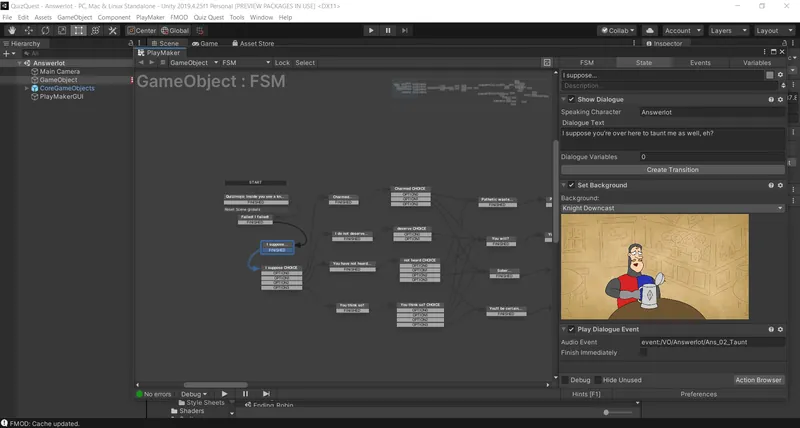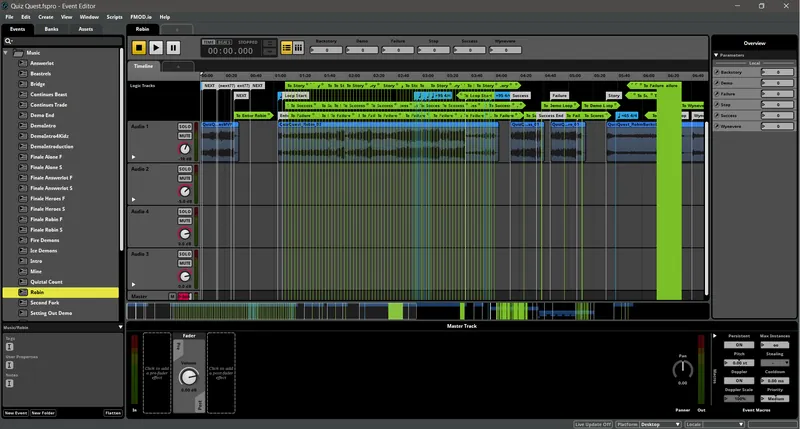In the previous post, I mentioned that our first goal was to create a ‘Minimum Viable Product’ (MVP) that would have everything necessary to demonstrate the core concepts and mechanics of Quiz Quest to potential investors and early playtesters. At first we were developing the game for remote team-building, with me presenting live whilst sharing my screen with the players via video call, and the players each using their phones to interact with the game. For this we needed some kind of online server to which each player could connect, and which could send the quiz questions and dialogue options to the players whilst keeping track of their scores and progress. Nate, our original developer, decided to use AWS, and it has served us pretty well ever since. We also decided to use Unity to create what would be presented on the shared screen. I think we chose Unity mostly because it has the visual scripting tool, PlayMaker, which allowed me to do the leg-work of building the scenes without touching a single line of code (phew!). Nate created all of the unique ‘Actions’ that we needed for the MVP at this stage. These included: presenting the visuals on the shared screen, showing the script to me on a private screen, triggering the music, displaying the scores, and sending the various choices to the players (dialogue options, weapon select, player select).

Nate also coded the four core quiz rounds that would be included in the MVP, each of them a variation of the multiple choice general knowledge format which is the main type of round in the game. The first round - for the first scene of the game where the failed knight, Sir Answerlot, tests the players’ abilities before sending them off on their quest - is a straight-up multiple choice general knowledge quiz of twelve questions (plus a bonus round of three more questions if the players fail) to introduce the basic mechanics. The second round - for the bow-and-arrow-wielding highwayman, Robin Yewblind - is a knockout round for individual players where one player chooses the category for another and risks them getting knocked out if they get it wrong. It also has a double-or-nothing bonus round of three questions for if the players fail. The third - for a flock of winged Ice Demons - is a quick-fire round with each player answering as many questions as they can against the clock. The fourth - for the final encounter against the evil dragon, Spontanius the Combustor - is six rounds of five tricky questions on a specified topic, each of which one of the players must face alone. In this round, the players can also make use of the Quiztals they have collected throughout the game to answer as a team and multiply their score.
For setting up the music to be triggered in Unity, we decided to use FMOD Studio because its user interface is similar to that of audio production software like Logic and Reaper, with which I am very familiar. (Again, I can work in FMOD without knowing a single thing about code!) It was all very intuitive and I soon learned my way around it, setting up loops, triggers and parameters so that the music could flow seamlessly between tracks based on the various commands from within PlayMaker.

Before we had the completed MVP, life was returning to some kind of normality after the COVID-19 lockdowns, so our focus shifted away from remote team-building with a live host to creating a fully automated game for general release. This meant scrapping the private screen for showing me the script, and automating the now pre-recorded dialogue using FMOD and PlayMaker. So, while I got to work recording, editing and incorporating the dialogue, Michael set about finding us potential investment. By an amazing stroke of luck, we were able to secure passes to the London Games Festival 2022 and access to the Games Finance Market where we could pitch Quiz Quest to publishers and investors. The festival was in April and there was still a lot of preparation to be done, not least creating a demo which would win people over…

